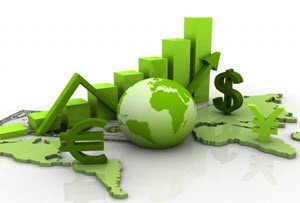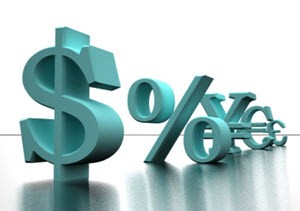Forex trading
The need to exchange one currency for another has existed for several millennia, but was intensified when currency that was valuable in itself (e.g. gold and silver coins) was replaced with currency that is essentially worthless in itself. A gold coin can be melted down and sold to a jeweler, so even if you travel from one country to another you will probably find merchants willing to accept your gold coin as payment. Trying to get a baker in Albania to accept payment in West African CFA francs will on the other hand most likely be met with considerably more resistance.
 Today, the global decentralized foreign currency market turns over enormous amounts of money each day. It is called the forex market or simply FX market. Even though the forex market is decentralized, there are a few hubs that are more important than others. Two of those are Thomson Reuters Dealing and the Electronic Broking Services (owned by ICAP plc).
Today, the global decentralized foreign currency market turns over enormous amounts of money each day. It is called the forex market or simply FX market. Even though the forex market is decentralized, there are a few hubs that are more important than others. Two of those are Thomson Reuters Dealing and the Electronic Broking Services (owned by ICAP plc).
Until the advent of the internet, it was quite difficult for individual investors to gain access to the forex market. The thresholds were high and the transaction costs significant. If you did have huge amounts of money to trade, there wasn’t really any point in even trying. The emergence of online forex trading has changed this, and today there are platforms available where even small-scale hobby traders can engage in forex trading. You no longer need to be a bank or huge multinational company to make money from forex trading.
New financial instruments such as binary options have given those who want to speculate on the currency market new options and made it easier to trade then ever before. Binary options allows you to make money on the currency market simply by predicting if the value of a certain currency will go up or down. You can try trading with binary option for free by using a training account.
Retail forex trading
As mentioned above, there are platforms available where you can register and make a deposit if you wish to try out small-scale forex trading. (By small-scale, we mean small compared to the trading carried out by major national banks.)
You don’t need a huge bankroll to try out retail forex trading since you can trade tiny amounts and build up your bankroll gradually. A common beginner mistake is to step up to new levels of trading too quickly – this can rapidly deplete your bankroll. Even if you have enjoyed a few weeks of solid success, be careful about taking your forex trading to a new level. You need to have a bankroll large enough to sustain you through patches of unsuccessful trading.
When online platforms for retail forex trading began to appear, they were quite rudimentary and didn’t offer much more than a primitive interface for selling and buying currency pairs. Today, the popular retail forex trading platforms tend to be jam packed with various features that retail traders can utilize, such as statistical aids, analyzing programs and automatic settings. You can either trade directly your browser or download and install a trading client on your computer. One of the newer additions in this field are trading platforms optimized for smart phones and tablets.
It is important to realize that forex trading is risky and that you may end up losing your money. If someone tells you that forex trading is low-risk or no-risk, you should question their reasons for doing so. Never trade with funds that you can not afford to lose.
Currency pairs
In the forex market, a currency pair is the quotation of the relative value of a currency unit against the unit of another currency. The currency codes used in fx trading are normally the ISO 4217 currency codes.
As of 2015, these are the four most traded currency pairs on the fx market:
| Currency pair | Explanation |
| EUR/USD | Euro / United States Dollar |
| USD/JPY | United States Dollar / Japanese Yen |
| GBP/USD | British Pound Sterling / United States Dollar |
| USD/CHF | United States Dollar / Swiss Franc |
Example: If you see the quotation EUR/USD 1.2478 it means that 1 Euro is exchanged for 1.2478 United States Dollars. For this currency pair the euro is the base currency and the dollar is the counter currency. For the currency pair USD/JPY it is instead the dollar that is the base currency, with the yen as counter currency. USD/JPY 120.0480 means that 1 dollar is exchanged for 120.0480 yen.
Pricing
 Why are some currencies worth more than others, and why is the value of traded currencies in a constant flux?
Why are some currencies worth more than others, and why is the value of traded currencies in a constant flux?
These are two complicated questions, because the value of one currency in relation to another can be affected by a multitude of factors. Below, we will take a look at three of them. It is important to take into account that the forex market sometimes reacts even to events that “shouldn’t” effect the value of a currency vis-à-vis another. Also, there are many examples of the forex market reacting in unforeseen ways. You may for instance see the value of the USD drop against the EUR when news are released that should, according to a more traditional view, strengthen the USD.
Factor #1 – The economic situation in the issuing country or union
Generally speaking, a currency issued by a country with a great economy will be worth more than a currency issued by a country where the economy is in dire straits. Exactly how to measure something as fuzzy as the economy of a nation or a union is of course open to debate, and different forex traders will take different factors into account. You can for instance take a look at GDP, retail sales, employment figures and national debt.
Factor #2 – The political situation in the issuing country or union
The forex market is usually quick to react to any signs of political instability and/or social unrest in the issuing country or union. In most cases, instability and unrest will mean a weakening of the currency. The general fear is that investors will avoid the area, and that international investors that are already committed to the area might start looking for ways to pull out.
Issues limited to a fairly isolated part of the country / union can be enough to trigger a reaction on the forex market.
Factor #3 – The commercial balance of the issuing country or union
The commercial balance, also known as net exports, of a country or union is the difference between the monetary value of exports and imports over a certain period, measured in local currency. A nation / union with a positive balance is said to have a trade surplus (it exports more than it imports), while a nation / union with a negative balance is said to have a trade deficit (it imports more than it exports).
A trade deficit is typically accompanied by a weak currency, while a move towards trade surplus is known to strengthen the currency.
Sometimes the government of a country will deliberately try to keep the value of their currency low in relation to other currencies to make nationally manufactured products more appealing abroad as well as domestically.